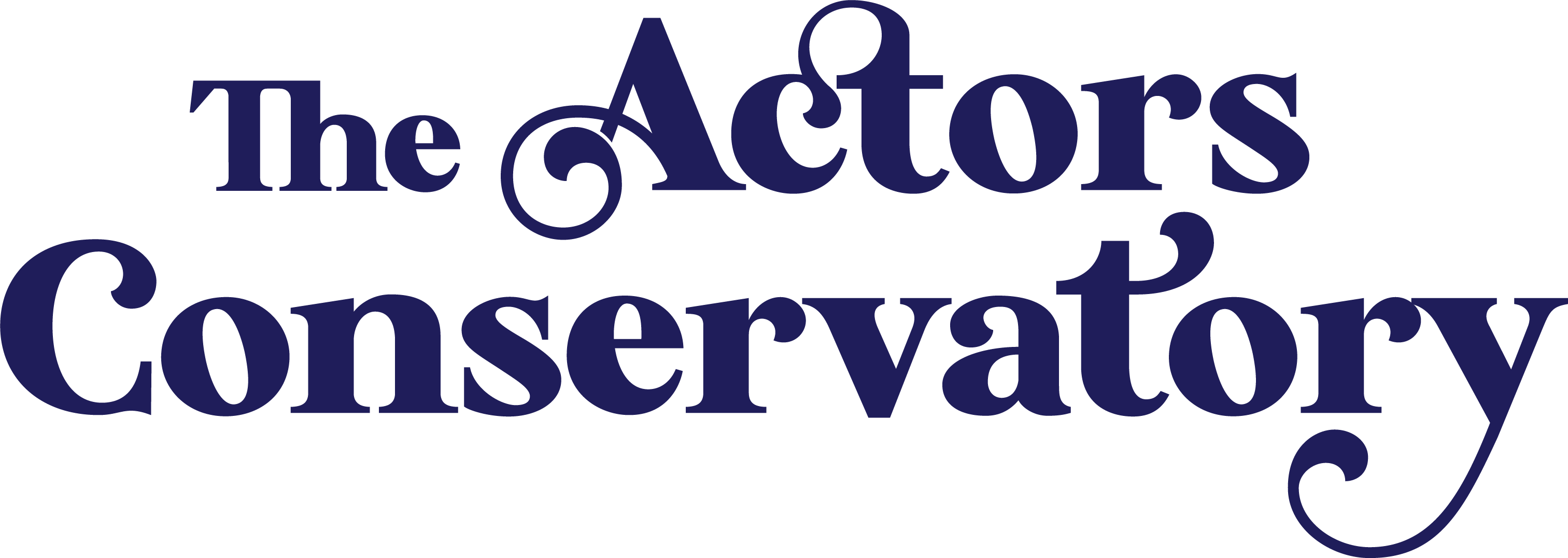Conservatory Program
In the Two Year Conservatory program, all of your passion for the art and commitment to the craft will be called upon for completing the professional actor training at The Actors Conservatory.
Most of your days will be spent in active exploration and meeting rigorous physical and vocal demands while grounding yourself in simplicity and stillness. At times, you’ll face what seem like insurmountable assignments. Once the school day is done, you’ll rehearse, working with partners and small groups toward creating a singular, theatrical event.
The Conservatory’s Two Year professional actor training program is a rigorous and intensive course of study for the serious student with a tenacious desire to become a professional actor. Classes in Movement, Voice, Acting Technique, Shakespeare, Styles, Beat Analysis, and more create a rounded experience for the disciplined theatre student.
Accreditation
The Actors Conservatory received full accreditation from the National Association of Schools of Theatre (NAST) in March 2008. A NAST-accredited school assures that students are in a program that meets rigorous academic, financial and administrative standards. Conservatory-eligible students are able to find funding through Federal Financial Aid, grants and student loans, and Conservatory work is more likely to be accepted as transferable credit with a college or university.
Course Catalogue
Coming soon!
Clock Hour and Credit Allocation
As a student in the first year program you will attend classes an average of thirty (30) hours each week. In the second year program, you will average thirty-three (33) hours weekly. TAC tracks classes through clock hours and credit hours. Clock hours are the actual hours spent in class in contact with the teacher. These hours do not include outside classroom hours spent rehearsing, memorizing, researching, and preparing.
Clock Hour Award
The Actors Conservatory is a stand-alone school dedicated to Conservatory style training. The students are required to take the program in its entirety and the majority of effort is centered in the classroom. The Conservatory requires an average of 30 hours of teacher classroom clock hours per week. Students can expect a minimum of 10 hours a week doing outside preparation in either written homework, Theory Into Practice or by lab hours. *(See definitions below)
Credit Allocation
Lecture and Discourse (L&D)
Lecture and Discourse classroom hours are considered to be one hour of hands on or lecture contact with faculty. For every hour the student spends in the classroom per week one hour is expected in either written homework, Theory Into Practice hours or by arrangement labs. Outside requirements may be more but never less. The total semester hours are calculated by multiplying the weekly contact hours by 16.
Short Classes (Short)
Short courses are calculated so that they contain the same number of hours as if the course were scheduled for a full semester. To maintain the integrity of the Conservatory program care is taken when scheduling short courses so that the adequate time for students to complete homework assignments, Theory Into Practice hours or by arrangement laboratory hours.
Laboratory Classes
For a laboratory class, the hours per week are all contained in class with minimal outside preparation required. They are calculated so they contain the same number of hours as if the course were a full semester. An Example of Laboratory classes are the required practicums in Theatre Management.
Outside preparation definitions
Out of Class Work
Out of class work is considered assignments required for specific syllabi. Examples may include: character beat analysis, character research, scoring and line memorization.
Theory Into Practice Hours (TIP)
TIP hours are assignments for students to put theory into practice by doing required “feet on the ground” rehearsal outside of class in their solo, duo, or ensemble assignments. The specific goal is for students to put into action the theories and techniques taught in the classroom setting.
By arrangement Lab Hours (Lab)
Lab hours are required work that must be done in the facility under direct supervision of a faculty member. An example might be one-on-one work or ensemble work with a teacher or tech prep for a presentation.
The Conservatory is divided into four types of classes: Core Acting, Instrument, Method and Skills, and Practicum
Location of Classes
The Actors Conservatory @ The Tiffany Center
1410 SW Morrison St.
Portland, OR 97205
